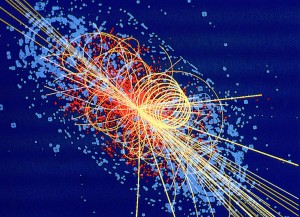What we see of the world is only a sliver
of what’s “out there.” There is much that is
invisible to the eye, even when we augment
our sensorial perception with telescopes,
microscopes, and other tools of exploration.
Like our senses, every instrument has a range.
Because much of Nature remains hidden from
us, our view of the world is based only on
the fraction of reality that we can measure and
analyze. Science, as our narrative describing
what we see and what we conjecture exists in
the natural world, is thus necessarily limited,
telling only part of the story… We strive
toward knowledge, always more knowledge,
but must understand that we are, and will
remain, surrounded by mystery… It is the
flirting with this mystery, the urge to go
beyond the boundaries of the known, that
feeds our creative impulse, that makes us
want to know more… This realization should
open doors, not close them, since it makes the
search for knowledge an open-ended pursuit,
an endless romance with the unknown.
( Marcelo Gleiser, The Island of Knowledge:
The Limits of Science and the Search for Meaning )
[物質永遠是「謎」一樣的存在]
於是我們終於明白,
物質永遠會是一種「神秘」mysterious 的東西,
自然界的「謎」mystery 永遠存在,絕對不會有終極的答案,
所以人類對自然界的思考和探索亦沒有止境!
自然界中其他「神秘」東西,還有「空間」、「能量」和「時間」。
所以「空間」、「時間」、「物質」和「能量」,
雖然可以量度,但在物理學中差不多屬於 undefined concepts。
Imagining the Fourth Dimension
理論物理學家當然不會放棄對「空間」和「時間」的探索,
然而他們對「空間」和「時間」的的解釋,
已經超出了一般人能夠理解的範疇。
Theoretical physics
The origins of space and time
http://www.nature.com/news/theoretical-physics-the-origins-of-space-and-time-1.13613#/reality
Mistakes are, after all, the foundations of truth,
and if a man does not know what a thing is,
it is at least an increase in knowledge if he
knows what it is not.
( Carl Jung )
即使我們肯定某樣東西的存在,
即使我們能夠準確地計算這樣東西的量,
並不表示我們已經徹底地理解這樣東西。
物理學裡不少以實體或者數據和概念存在的東西,
人類只能夠好像剝洋蔥那樣,逐層、逐層地深入去瞭解,
但它們究竟是甚麼,它們究竟如何存在,
永遠會是一個「謎」,因為「謎」永遠存在!
換言之,我們常常說的「迫近真理」,
其實只不過是再剝掉了一層洋蔥而已,
我們完全不知道下面還有多少層!
「計人之所知,不若其所不知!」
《莊子。秋水篇》
「至大無外,謂之大一;至小無內,謂之小一。」
《莊子。天下篇》
Scientists often invent words to fill the holes in
their understanding. These words are meant as
conveniences until real understanding can be
found. Sometimes understanding comes and the
temporary words can be replaced with words
that have more meaning. More often, however,
the patch words will take on a life of their own
and no one will remember that they were only
intended to be placeholders.
( Scott Adams, God’s Debris, p.20, 2001 )
再說,萬有引力也是一種神秘的力量,
看不見,摸不著,身體感覺不到,
但卻無時無刻地在支配和限制著個人的生命,
亦保護著個人的生命。
用數學形式「GM1M2 除以R平方」來表達的時候,
萬有引力的公式看起來十分簡單和精確,似乎很容易理解,
但實際上萬有引力操作的程序尚是一個謎,
因為我們並不知道為何兩個物體會產生吸引力,
而為何方程式會這樣簡潔,也是一個謎。
我們可以如何想像這種可以通過真空,
完全不需要接觸,遙遠地操作的影響力?
萬有引力,的確耐人尋味。
如果不是因為萬有引力是「位能」的成因的話,
我們甚至可以說萬有引力是以數學的形式存在!
同理,帶正電的原子核和帶負電的電子之間的引力,
就和萬有引力一樣,同樣耐人尋味。
帶負電的電子在原子之中究竟以甚麼方式存在,
以甚麼方式運動依然是一個「謎」!
由於有萬有引力及物質之間的其他作用力,
物質和力是永遠共同存在的,
就好像人和命運是永遠共同存在的一樣!
至於「能量守恆定律如何操作?」
「為何物質和能量可以互相變換?
它們們究竟用甚麼方法互相變換?」
都依然是一個謎,
我們只能夠用「嘆為觀止」來描述。
如果物質和能量可以互相變換,
那麼它們就可能是同一樣東西以不同的方式存在,
那麼物質究竟是甚麼?而能量又究竟是甚麼?
我們每天都在和它們打交道,表面上十分熟悉的物質世界,
其實還是一個「謎」一樣的世界。
A physicist of this century,
interested in the basic structure of matter,
deals with radiation he cannot see,
forces he cannot feel, particles he cannot touch.
( Lloyd Smith, 1951 )
簡而言之,物質世界的存在,
是可以用感官或儀器去觀察和測量的存在,
可以稱為 observable existence,
物質世界的存在包括有兩種方式:
物質的方式和數據的方式。
至於生物的存在,是以物質的方式和數據的方式一起操作,
遺傳基因中的數據更進一步地以結構的方式存在,
而結構中就蘊藏著生物界的資訊 information。
但究竟甚麼是生命,依然是一個謎!
至於人類的「意識」consciousness 和「思考」thought,
是以怎麼樣的方式存在,
人類的「精神」和「意念」又是否能量的一種形式,
是否可以互相變換,暫時還是一個謎。
人類的「思考、精神、意念」除了要依靠人這種物質,
要輸入能量之外,還是否需要其他額外的條件,誰知道?
In my search for the secret of life, I ended up
with atoms and electrons which have no life
at all. Somewhere along the line, life has run
out through my fingers. So, in my old age,
I am now retracing my steps…
( Albert Szent-Gyorgyi )
I regard consciousness as fundamental.
I regard matter as derivative from consciousness.
We cannot get behind consciousness.
Everything that we talk about,
everything that we regard as existing,
postulating consciousness.
( Max Planck )
It was not possible to formulate the laws of
quantum mechanics in a fully consistent way
without reference to consciousness.
( Eugene Wigner )
神秘、謎、存在、批判、信仰……
就是一切科學和藝術的根源,也是人類「宗教感受」的濫觴。
「玄之又玄,眾妙之門。」 《道德經。第一章》
The finest emotion of which we are capable is
the mystic emotion. Herein lies the germ of
all art and all true science…
the core of the true religious sentiment.
In this sense, and in this sense alone,
I rank myself among profoundly religious men.
( Albert Einstein )
但從真理的角度來看,真理不會覺得自己神秘,
所以謎只是存在人的腦中:
Mystery exists in the mind, not in reality.
( Eliezer Shlomo Yudkowsky )
Science cannot solve the ultimate mystery
of nature. And that is because,
in the last analysis, we ourselves are a part
of the mystery that we are trying to solve.
( Max Planck )
